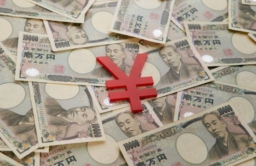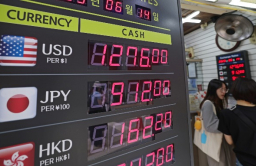-
KOSPI 2577.27 -2.21 -0.09%
-
KOSDAQ 722.52 -7.07 -0.97%
-
KOSPI200 341.49 +0.02 +0.01%
-
USD/KRW 1396 -2.00 0.14%
Koreans' Japanese yen savings hit record high in July
Foreign exchange
Koreans' Japanese yen savings hit record high in July
Korea's yen-denominated deposits topped $8 billion in July for the first time since the yen fell to 9.10 per won vs 9.56 a year ago
By
Aug 25, 2023 (Gmt+09:00)
2
Min read
News+
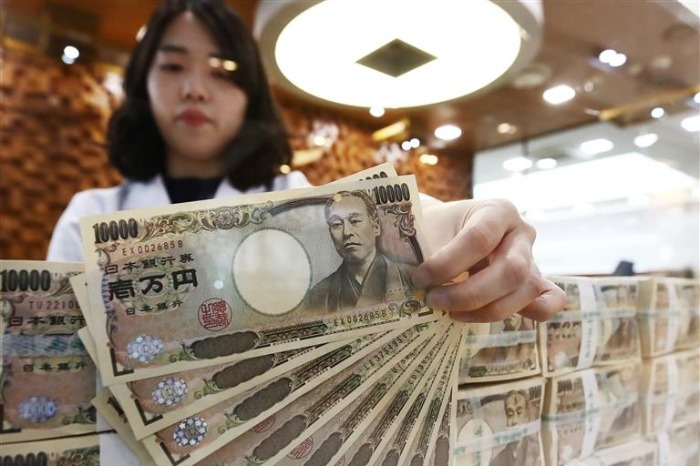
South Korean investors continued gobbling up the Japanese currency, which has remained weak against the Korean currency after retreating from a one-year peak in early April, leading yen-denominated deposits in Korea to hit a record high last month.
According to Bank of Korea (BOK) data on Friday, residents’ yen-denominated deposits at banks amounted to $8.31 billion, up $830 million from a month earlier after extending gains for the third straight month.
It was the first time for the country’s yen-denominated deposits to surpass $8 billion. The previous record was $7.48 billion marked in June.
BARGAIN HUNTING
Koreans' strong appetite for the Japanese currency has continued as the yen has remained weaker against the local currency, prompting bets for exchange gains from a possible recovery in the yen later.
The yen averaged at 9.10 per won in July, weaker than 9.56 from the same month last year.
In early April, the yen hit a one-year high of 10.03 amid growing financial market uncertainty from the collapse of US banks sparked by the failure of Silicon Valley Bank.
The yen, however, started retreating after new Bank of Japan Governor Kazuo Ueda in June hinted that the central bank would maintain its loose policy stance for some time.
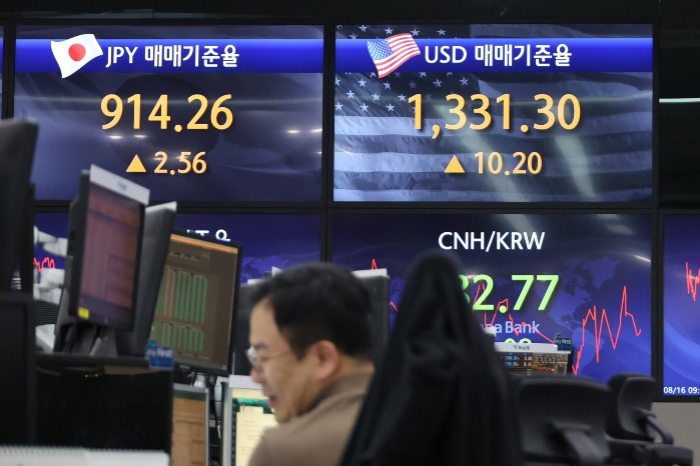
The yen even dipped below the psychological support line 9 to the won in mid-June and has been hovering around the low 9 level, spurring demand from bargain-hunting retail and institutional investors.
But yen-denominated deposits are expected to increase at a slower pace or decline in August as the yen has been heading north after staging a rebound from 8.99 to the won on July 31.
The yen even hit 9.37 per won on Aug. 18, its strongest since June.
Strong demand for the yen will also likely elevate the value of the Japanese currency, analysts said.
The yen finished at 9.07 on Friday, lower than 9.11 in the previous session.
US DOLLARS RISE BUT EUROS DROP
US dollar-denominated deposits also extended gains for three months in a row in July, amounting to $87.86 billion with a $4.42 billion on-month addition.
US dollar deposits increased on a rise in local companies’ foreign currency-denominated debt sales to secure funds.
But euro-denominated deposits lost $70 million to $6.02 billion over the same period.
Overall residents’ foreign currency deposits in Korea increased by $5.17 billion on-month to $105 billion in July, extending the growth streak for the third month in a row.
Residents’ foreign currency deposit refers to foreign money parked at banks by Korean individuals and companies, as well as foreigners residing in Korea for more than six months and foreign firms operating in the country.
Write to Jin-gyu Kang at josep@hankyung.com
Sookyung Seo edited this article.
More To Read
-
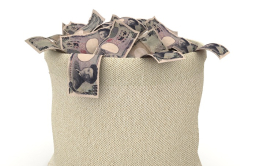 Foreign exchangeS.Koreans continue buying spree of sliding Japanese yen
Foreign exchangeS.Koreans continue buying spree of sliding Japanese yenAug 10, 2023 (Gmt+09:00)
-
Jun 23, 2023 (Gmt+09:00)
-
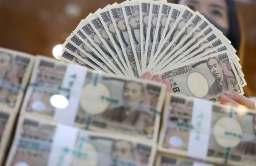 Foreign exchangeYen breaches key level vs Korean won to hit 8-year low
Foreign exchangeYen breaches key level vs Korean won to hit 8-year lowJun 19, 2023 (Gmt+09:00)
-
Jun 14, 2023 (Gmt+09:00)
-
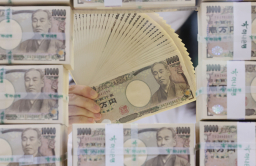 Banking & FinanceS.Koreans boost Japanese yen savings to record high
Banking & FinanceS.Koreans boost Japanese yen savings to record highMar 29, 2022 (Gmt+09:00)


